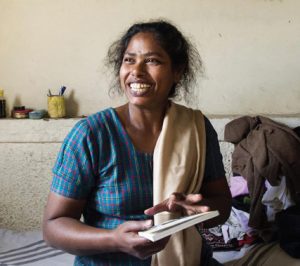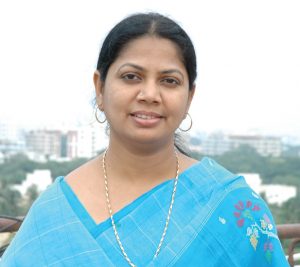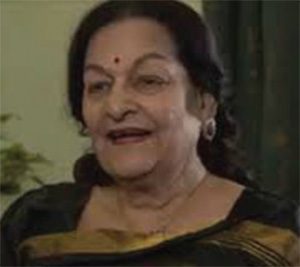
The Invisible Ones
Urvashi Butalia shares real stories about real women spear-heading the change in India
I AM going to share with you three stories of the kind of woman that we see everyday in our lives but don’t take much note of.
Baby Halder: A domestic worker, she is the kind of woman who would work in our houses – sweeping, cooking, cleaning the house, etc. Baby comes from a poor family where the father was alcoholic as well as abusive and violent. This led to the mother leaving home very early with her only male child, leaving behind the two girls with their father. He, like many fathers when saddled with two girls, was keen to get rid of the daughters. He married Baby’s sister to someone very early and at that ceremony Baby, who was 12 years old, was seen by a man 14 years her senior. He came the next day and asked her father if he could marry her. The father agreed, happy to have killed two birds with one stone. Married at 12, Baby became a mother at 13. This is a fate common to many women. She had three children. Her marriage was empty, violent and abusive. Her husband was poor. He had no work and she tried, time and again, to do something like tuitions to earn from the neighbourhood but couldn’t as the husband didn’t want her to step out of the house.
One day, fed up, Baby picked up her three children and left. She boarded a train from Howrah to Delhi without a ticket, sitting outside the toilet with her three children. The TC saw something in this young woman and let her be. She arrived in Delhi, no money, three children and a scrap of paper with the incomplete address of her brother who was a car mechanic in Faridabad. Baby went to Faridabad and, at the station, she asked a rickshawala where she could find car mechanics. He took her there and lo and behold she found her brother. The brother was not happy to see her. Who wants four extra mouths to feed when you barely have enough to feed your family? And, he didn’t like the fact that she had arrived without her husband. But families are strong things in India. He took her in and looked after her until she managed to find a job at the home of a retired professor of IIT, Delhi, who also happened to be the grandson of one of India’s famous writers, Premchand.

Domestic help Baby Halder wrote the story of her life and is now being published in 23 languages. Her children will get the education she wants for them
He, Prabodh Kumar, noticed that Baby spent a lot of time in the library while cleaning the house. He walked in one day and saw a book in her hand. He asked her to read it title. Nervously, she did. She had only studied till she turned 12. He asked her about her life and found that she had desperately wanted to study but could not because she had gotten married. He then loaned her books and gave her two hours off to read. A year later he gave her a notebook and a pen and asked her to write whatever she wanted, may be her about her life. She thought to herself, ‘What is my life? What can I write?’ But she did begin. This life went to being a best-selling book which is being published in 23 languages across the world in India and abroad and Baby is now a celebrated writer. She continues to do domestic work but her life has changed substantially and she has been able to give her children education.

Rokkaiah is from a conservative community in Tamil Nadu. She wrote a book of erotic poetry under the pseudonym Salma. She threw off her veil and went on to become a successful literary and political figure
The second story is of Salma, Tamil Nadu. She comes from a very tight-knit, conservative Muslim community in Tamil Nadu where all the men are in the Gulf and all the households in the village are female headed households. Here, the practice is, young girls are pulled out of school when they begin menstruating and kept at home in readiness for marriage. This happened with Salma too; she went to school till she was 12 and for the next eight years did not see the road outside the house. At 20, her marriage was arranged to a man from neighbouring village who had a political family which stood for village-level elections. During the time Salma was imprisoned in the house, her mother and her brother, the people who were actually implementing the practice of imprisoning girls were also deeply sympathetic towards her and understood her desire to study, read and write.
Her brother smuggled in books which she read and Salma wrote poetry – passionate, erotic poetry about the female body as she saw changes in her body. Her mother smuggled these out and had them published under the pseudonym Salma, her real name is Rokkaiah and the Tamil establishment, totally male, very caste-riddled was aflame by this woman who they did not know. Who was the secret woman writing all this revolutionary stuff? They had no idea until Salma revealed herself after publishing the novel and going to the launch in Chennai. That was the first time her husband got to know that his wife was a writer. After this, something happened that changed Salma’s life radically.
The Indian state brought in the 73rd and 74th amendment to the Constitution: the Panchayat Raj, which made it mandatory to keep 33 per cent elected posts at the village level reserved for women. The post Salma’s husband stood for became reserved. He, like many other families, decided to let any family woman stand as a proxy while he would wield the power behind her. They asked every woman in the family except Salma. Every woman said no. They were not used to power and did know how to deal with it. Salma stepped up and said she would do it. Having no choice, the family agreed. The first thing that gave way was Salma’s veil, which she took off, because you cannot campaign without a face. She went on to become both a successful writer and a successful political figure in Tamil Nadu.
My third story about IAS Rupan Deol Bajaj who was very high up in the Ministry of Finance in Punjab: at a party at the house of the Finance Secretary, she was slapped on the bottom publicly by KPS Gill, then the DG of Police in Punjab and the man credited with ending militancy in Punjab. She took him to court, fought the case for 17 years and she won. But it took a lot out of her. At the time when Rupan Deol Bajaj filed the case, the Indian state had no law in place to deal with what was obviously a case of sexual harassment at the workplace.

IAS officer Rupan Deol Bajaj was slapped on the bottom publically
by KPS Gill, then the DG of Police in Punjab and the man credited with ending militancy in Punjab, at a party at the house of the Finance Secretary. She took him to court, fought the case for 17 years and won
Even though it was a party, she was working, in an official capacity. Later, this law came into place as a result of another incident that followed which was the case of a Dalit woman from Rajasthan, Bhanwari Devi. She was part of a large development programme called the Women’s Development Programme.
Under this, she was charged with the responsibility of implementing government policy at the village level and one of these policies was to put an end to child marriages which are rampant in Rajasthan. Hearing of a child marriage in a Gujar, upper caste, household, Bhanwari had gone there to try and persuade to stop the children getting married. Angered that a Dalit woman could have the guts to tell the upper caste what to do, the Gujars took their revenge by gangraping Bhanwari. The case went to court and is still in court. However, one of the interesting things that happened due to the case was that the women’s movement in India started to ask the question: what does the workplace mean for women?
Does it mean just the four walls of an office?
Does it mean the home where she is working as a domestic helper? Can it be a field in which she is farming? Can it be in transition from home to the field and so on? Who is responsible for women’s safety, security and respect? It was that campaign that led to put in place what is known as the Prevention of Sexual Harassment at the work place, the PoSH act, today, which is mandatory to all businesses and corporates, organisations, etc.
What do these stories of hardship and poverty have to do with all of you? My answer is – nothing and everything. Nothing because all those women are around us, but we hardly see them. Or, rather, we see them but not as human beings who have feelings, who have their ups and downs, who have their stories and dreams. And ‘everything’ because for me what these women represent is something that we never talk about in India. How every woman in this country, no matter from where and what caste she comes from, carries with her in her heart, the desire to change realities of life and live her dreams. Some of them manage to do it while others do not because they do not have enough opportunities.
To me, in India today, it is these women who are driving the change. I think it is time we turn our attention to them. It is time we hear what they want to say. They are saying that ‘we are no longer content to stay within the four walls, we too want to be part of the productivity and change’ and, despite the odds, they are living their dreams but we do not notice them.
A figure that strikes me as significant is when I said that Salma was benefited by the amendment of the Constitution, in the first-ever election after that amendment, about 8,000 women came out to stand for elections. Today, of the three million elected posts at the village level of India, 1.4 are occupied by women. No matter how we say some of them might be proxies for their husbands, but a majority of them are doing quite well at their work. By and large, they are not corrupt because they are not used to dealing with that kind of money. Men occupying those posts are deeply corrupt.
So what they are doing there is looking at sanitation, schools, community centres and health. On the ground, these women are creating a revolution to change the conditions that create poverty and as such their contribution should be complimented. Far-reaching changes in this are evident in the voting of women in India today. Women voters are increasing at a much faster pace than men. Studies show that they are no longer voting at the behest of their male counterparts, community or Panchayat leader. Instead, they are choosing themselves.
So, just think, women are fighting for the things in our country that men take for granted. India got its first female doctor only towards the late 18th century and early 19th century. You can see only now see women becoming pilots. Let me ask this question: what is difference in the anatomy? Because, after all, that is all that differentiates between men and women, and what does that have to do with the capability of flying a plane? I have never found an answer to that question.
One of the things that I find tragic is that how much this country is using by not recognising the potential of a woman. It is not enough to offer gas cylinders and toilets; the first step is to recognise women as equal citizens. But our standard reaction is not that. Take a look at the recent campaign of #MeToo which has thrown the political and corporate world into confusion with women making allegations of sexual harassment against very powerful figures. The general assumption here is that the women are making unnecessary problems, that they are lying and that sexual harassment is a minor problem.
Before we got the PoSH act, it was called eve-teasing, but it is not teasing. But the reaction of the corporate world is not to understand that it is a serious problem and we need to address it but to say let’s not employ women – they are nothing but trouble. I have always wondered why, for example, when we talked of reservations for women in Parliament, opposition from male politicians is about women being incapable of power, having short hair and not the intelligent reaction that actually we need a bigger house.
594 seats is not enough for 1.4 billion people. We had 300 and something at Independence. We are 70 years down the line, surely we need 700 plus seats. Let’s get them and give them to women. You are not going to lose power. But, instead, the reaction is a hostile one saying aurton ko nikal do unka koi farak nahi padta.
Gender sensitive change can make a difference. I was talking to the CEO of a large industrial company employing both men and women in its unit. He was saying that they were quite mystified by the inefficiency of women’s behaviour when it comes to using machinery. When they started talking to the women, the women said that the overalls that were made were for men and the women found it difficult to move in them. The gloves they made were for male hands and they could not be nimble fingered in them; the helmets are for male heads and the shape of their heads was smaller. The company then changed and took the female body into account and created overalls, gloves and helmets according to size and productivity increased exponentially.
Similarly, there are many things which go unnoticed but are discriminatory to women, things like the cockpit in the airplane, the passenger seats, lapel mics, I don’t wear a suit so while interviewing I have to hold that mic in my hand – these are everyday things.
An example from my own life, for about five-six years, I was heading the publishing committee at the FICCI and every year we organised a large event called the CEO Speak for the publishing community, at the time of the World Book Fair in Delhi. As head of the community, it was my job to open the proceedings after opening speeches by the Director General and other luminaries. Year on year, the DG of FICCI was unable to you remember my name. He would get up and take everyone’s name, and he would say Ms Urmila or Ms Bhatia. It is not a difficult name Butalia is a different surname but it is a Punjabi surname. He could have got it if he had written it on a piece of paper.
Two years running, the head of the National Book Trust, Bhai Baldev Sharma opened his remarks by mentioning every name at the table but me. I could see no other reason behind this except that I am a woman. If you would have been in my place you would know that helplessness in public situations, you know that you are being insulted. As a professional, do you get on stage and raise that or do you get on stage and take responsibility and take the event forward as it should be. It is a tough thing but women face it.
What can we, as relatively privileged members of society, do to fulfil the dreams of poor and marginalised women? Is there a way to look at our daily lives and see how we unthinkingly exercise discrimination which is harmless for us but can be very hurtful for the person at the receiving end?
When I came here, I was introduced to a few of you and I was asked what I was going to speak about. I said I would speak about women. And, in almost every instance, there was a slightly uncomfortable, gentle laugh. I am sure no one intended an insult but I am also sure that if I had said that I was going to speak about solar power you would have not laughed. You might have said that is interesting, I don’t know much about it, I would like to hear about it. But with women there was a slight hmm… kya bole usko.
So, as I am looking for change, one of the positive things is that if 20 years ago I, as a feminist, had come to speak to you as industry leaders, you would have not given me the time of day. But today, we are talking. I think that is the beginning of the conversation that we should be having, to start a dialogue that assumes that we cannot move ahead as a progressive country if one half of our population has to beg, fight or demand for all the things that you take for granted. Have you ever thought that for you, you did not really have to ask for your education but for your sister, they had to ask because for them marriage was the horizon. For you education, job and career were the horizon. It is time to shift that horizon so everybody can share it.













